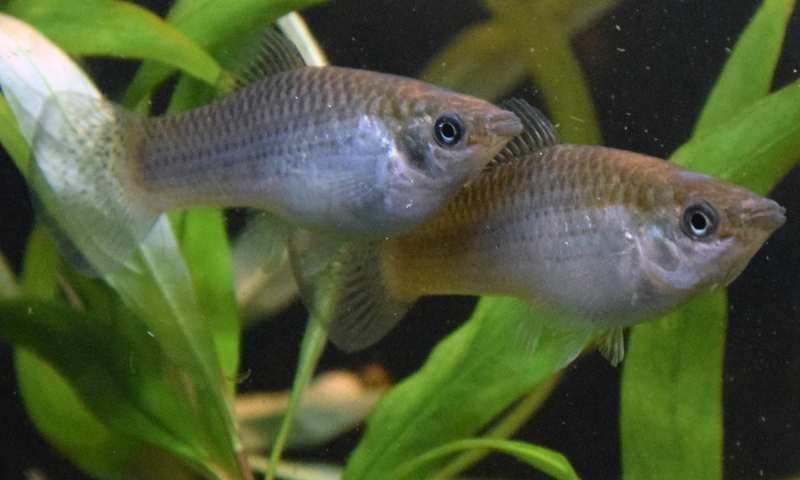Same genes, same environment, different personality: Is individuality unavoidable?

Genetically identical Amazon mollies raised individually and under identical environmental conditions, nevertheless develop different personality types. Additionally, increasing the opportunity for social interactions early in life appears to have no influence of the magnitude of personality variation. These results of a recent study by the Leibniz Institute of Freshwater Ecology and Inland Fisheries (IGB) shed a new light on the question of which factors are responsible for the individuality of vertebrate animals.
Both the genetics and the environment have an effect on the individual behavior of animals – or at least that is the common doctrine. But what happens when individuals whose genes are identical are raised in environments that are identical – do they then develop identical behavioral patterns?
A team headed by IGB researchers Dr. David Bierbach and Dr. Kate Laskowski investigated this question in a study, which was published on 17th of May 2017 in the journal Nature Communications. The IGB scientists were able to show for the first time that genetically identical animals develop different types of personality even if they are raised under almost identical conditions.
Investigation of activity and exploratory behavior
The IGB team used the Amazon molly, a livebearing Poecilid species. These animals are natural clones, meaning all the offspring of one mother have exactly the same genetic material. Newborn Amazon mollies were placed in three different experimental setups: In the first treatment the animals were kept individually from and under identical conditions from birth. In two other treatments the fish lived for one or three weeks, respectively, in groups of four individuals and were then later separated. After seven weeks, the researchers examined all the Amazon mollies to determine whether and how the individual fish differed in activity and exploratory behavior.
Distinct personality differences
"We were very surprised to find such distinct personality differences in genetically identical animals that grew up under nearly equal environmental conditions," says Dr. David Bierbach, behavioral ecologist at the IGB and one of the two leading authors of the study. The fish which developed initially in small groups, also showed behavioral differences of nearly the same degree - no matter whether the development phase with social interactions lasted one or three weeks.
Study indicates that individuality may be inevitable
"Our results suggest that other factors must influence the development of personality in a more substantial way than previously thought: potentially minute differences in environmental conditions, which are impossible to remove completely from any experiment, or potentially epigenetic processes, i.e. random changes of chromosomes and gene functions. Altogether our results suggests that these factors deserve closer inspection as causes of personality variation in future work," explains behavioral ecologist Dr. Kate Laskowski. The IGB study suggests that the development of individuality in vertebrate animals may be an inevitable and ultimately unpredictable result of the developmental process.
More information: David Bierbach et al. Behavioural individuality in clonal fish arises despite near-identical rearing conditions, Nature Communications (2017). DOI: 10.1038/ncomms15361
Journal information: Nature Communications
Provided by Forschungsverbund Berlin e.V. (FVB)




















